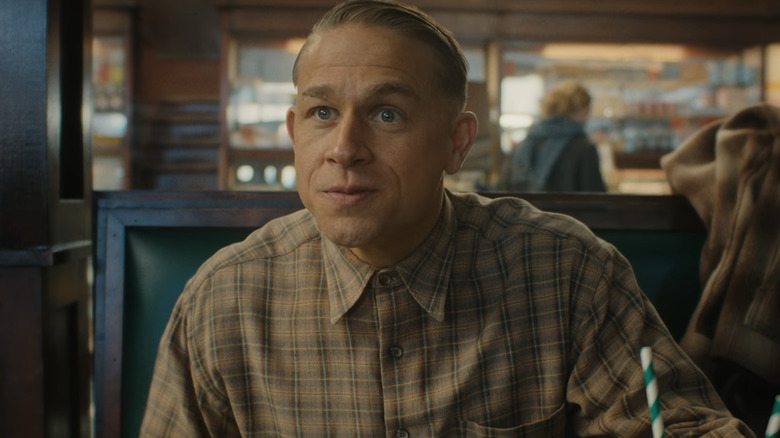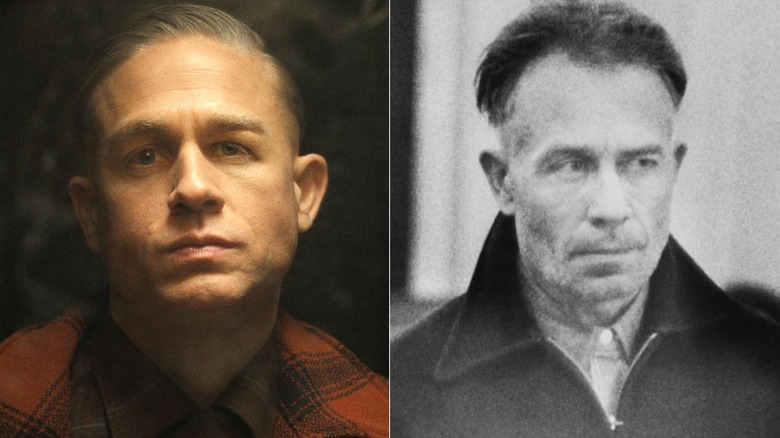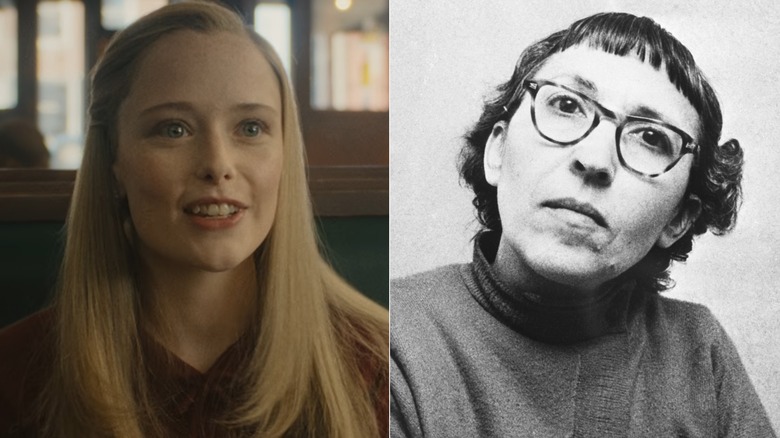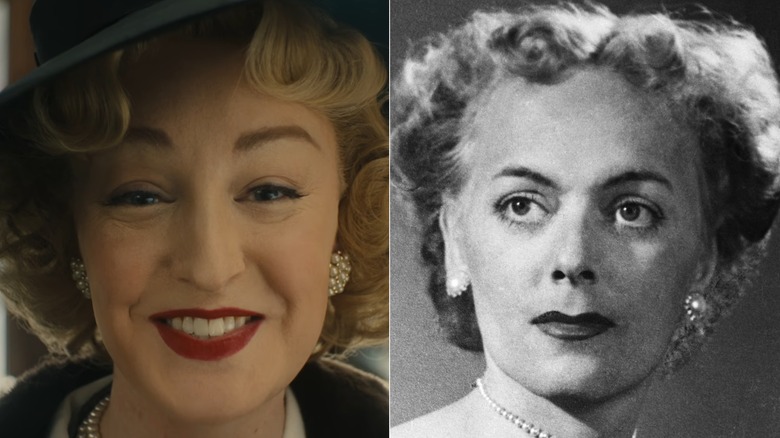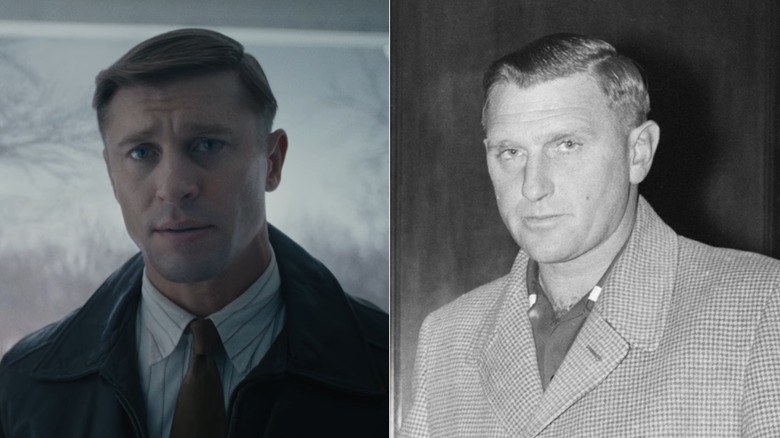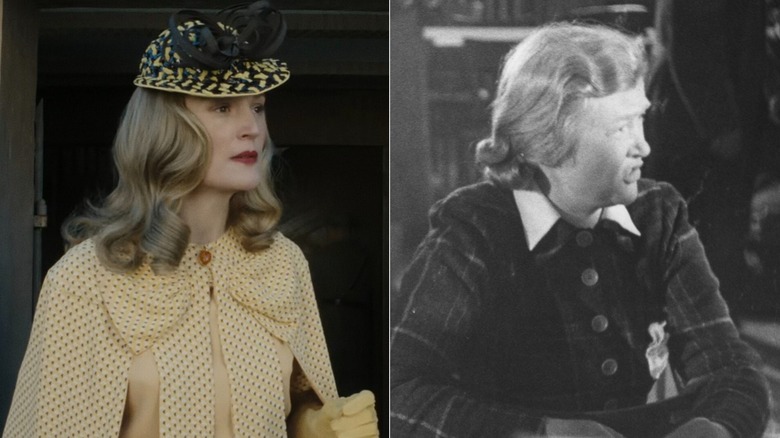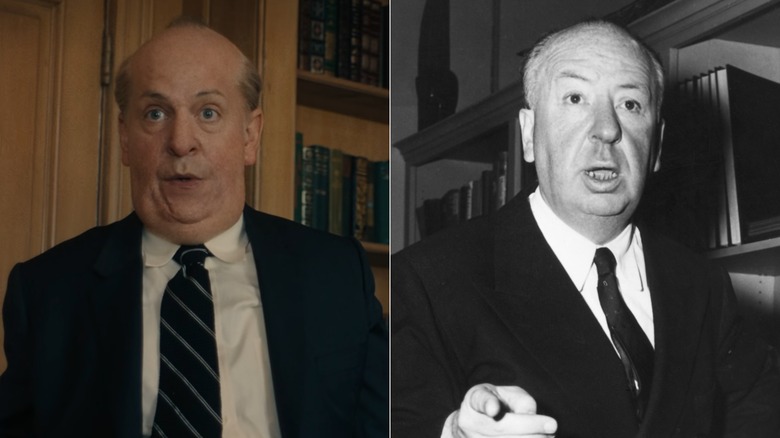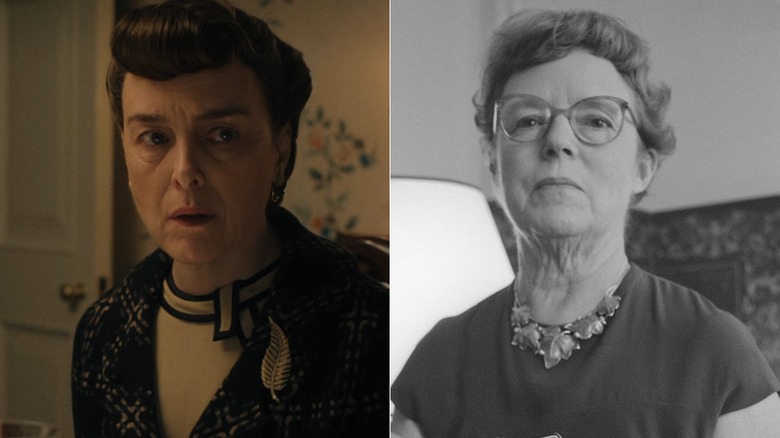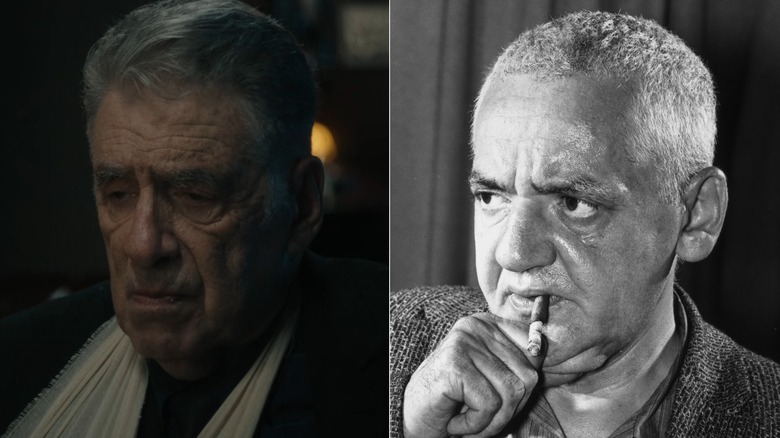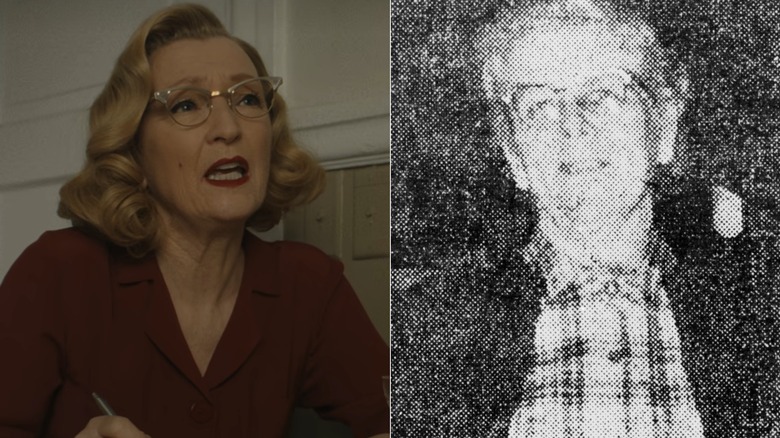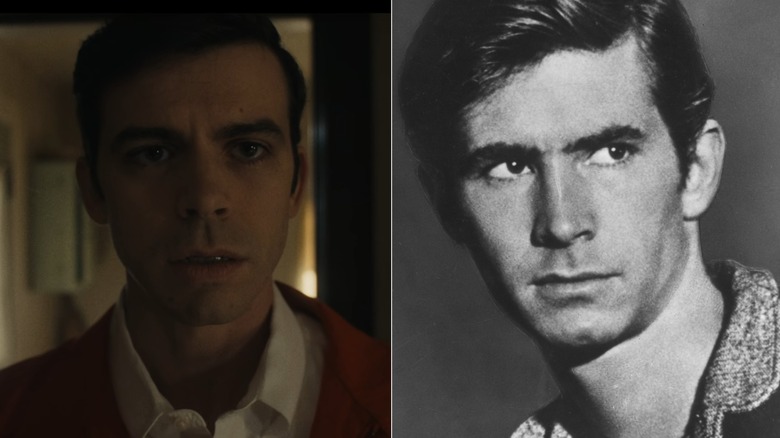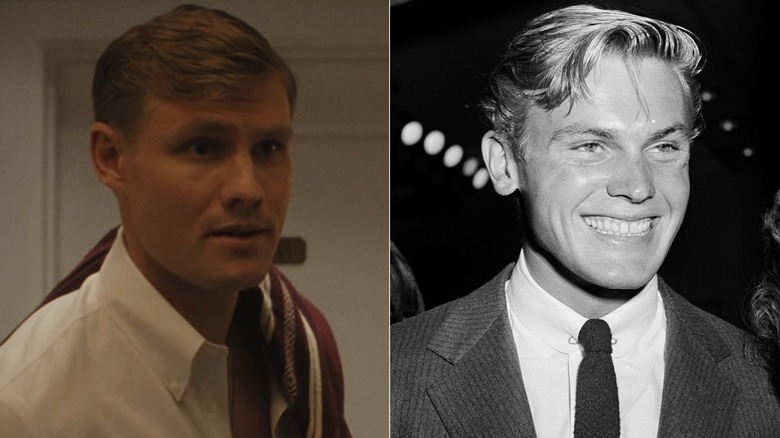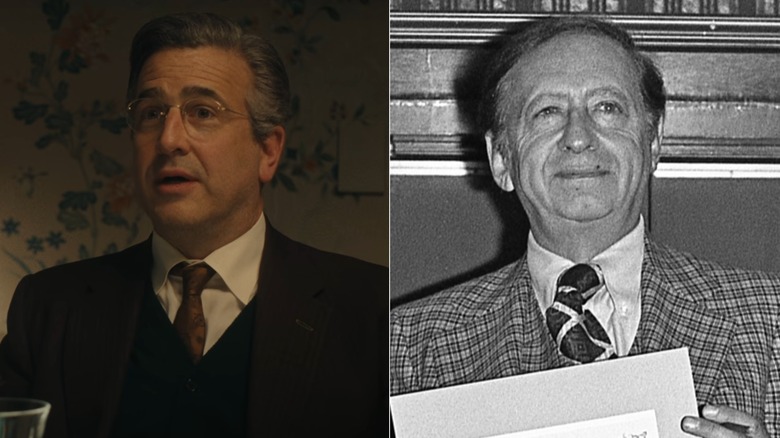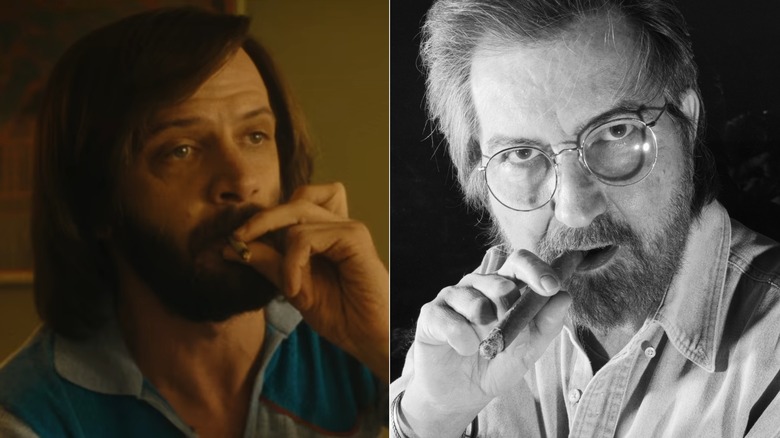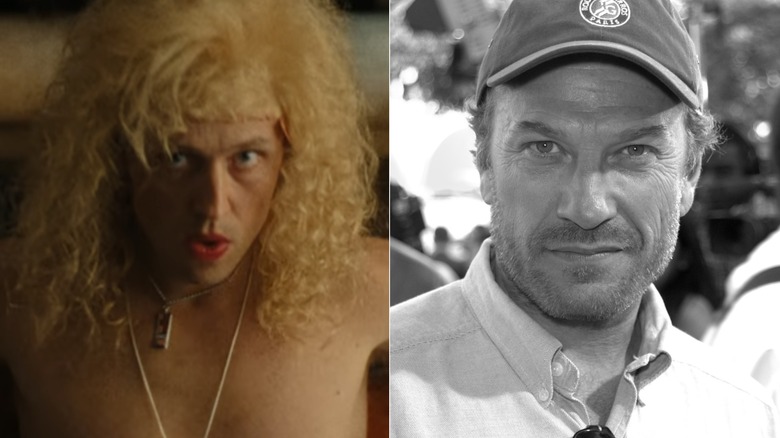What Monster: The Ed Gein Story's Characters Looked Like In Real Life
Given that he's inspired at least three iconic horror films, the true story of Ed Gein is one ripe for dramatization. And Ryan Murphy did exactly that when he used his true crime anthology series "Monster" to cover Gein in its third season, subtitled "The Ed Gein Story." Gein horrified and captivated the nation in equal measure, in large part thanks to how his acts were uncovered as American media was growing increasingly obsessed with violence. This made him among the first "celebrity" criminals, being covered by both the television news, while also inspiring fictional works not long after the fact.
"Monster: The Ed Gein Story" covers both of those elements of Gein's history — the man himself, and the media attention that sprung up around him. Being a fictionalized version of Gein and the ensuing pop culture aftermath, everyone here is played by actors. But many of the people featured in "The Ed Gein Story" are at least loosely based on real people, and it leads one to wonder how much the performers resemble their real life counterparts.
Here are the side-by-side comparisons of "The Ed Gein Story's" main cast with the real people they portrayed. As a note, this feature will go easy on spoilers for those who have yet to finish the show, but are still curious of the comparisons nonetheless.
Ed Gein (Charlie Hunnam)
After "Sons of Anarchy," Charlie Hunnan shifted his focus on to movies, but was never opposed to returning to the small screen when the right project came along. Unsurprisingly, he couldn't pass up the opportunity to stretch his acting chops by portraying Ed Gein, a performance unlike anything Hunnam has done before. As for the real Ed Gein, while he is often referred to as a serial killer, it's a questionable label. He only ever confessed to committing two actual murders, and was only tried for one of them. The various dead bodies and body parts found throughout his home, as well as the furniture pieces and costumes fashioned from human skin, were said by Gein to have come from stolen corpses of people he didn't kill.
Of course, it's difficult to know how true Gein's confessions actually were, and be certain he didn't murder more people. But as it stands, there isn't enough concrete information available to officially declare him a serial killer. Not that he didn't commit many gruesome crimes or engage in cruel and abusive behavior even without that specific label — much of which "The Ed Gein Story" depicts in unflinching detail.
Adeline Watkins (Suzanna Son)
The real Adeline Watkins was a woman who knew Ed Gein for over 20 years. Initially, she talked it up as a romantic relationship, describing their dates and even saying Gein proposed to her at one point. She was also infamous for never having unkind words about Gein when discussing him with the press. Watkins found herself a reluctant celebrity as a result — and received backlash for having a boyfriend like Gein — and later retracted all of her claims of the pair being a couple, insisting that they were never more than platonic friends.
"The Ed Gein Story" chooses to portray the relationship as initially described by Watkins prior to walking most of her comments back. Actor Suzanna Son plays a version of Watkins that seems instantly smitten with Gein and falls for him in spite of — or more specifically, because of — his unusual personality and unique brand of awkward, unsettling charm. Son gushed to the outlet Women's Wear Daily while filming "The Ed Gein Story" about what a dream it was to work on the series and how much it helped her grow as a performer. She mused, "I feel like I'm the luckiest girl in the world. I could quit after this."
Christine Jorgensen (Alanna Darby)
"The Ed Gein Story" shows Gein learning of people who were assigned as men at birth but transitioned into women, and the profound effect that revelation had on him. He reads about an actress named Christine Jorgensen, who had previously lived as a man and even served in the military before having a sex change operation — an outdated term for the procedure, but nevertheless what it was referred to at the time. In the series, Jorgensen is played by Alanna Darby, herself a trans actress, social media personality, and life coach.
In fact, Jorgensen was not only a real person, but she indeed was an openly trans actress and singer who made history as one of the first known Americans to have gender-affirming surgery. In spite of coming out as openly trans at a period when America was far from progressive in that regard, Jorgensen maintained a prolific acting career for the rest of her life. She was also a tireless activist and public speaker, and is considered a trailblazer for not only trans visibility but also the entire LGBTQ rights movement in the United States in the 1960s and '70s.
Arthur Schley (Tyler Jacob Moore)
Law enforcement officials typically take a back seat to the more murderous subjects of most real life crime adaptations. But when you're the man who led the investigation — and subsequent arrest of — Ed Gein, history will take care to remember you. Such is the case for Sheriff Arthur "Art" Schley, who is not only a named character in "The Ed Gein Story" but had a deliberate effort made to find an actor that resembles him.
To that end, Tyler Jacob Moore is almost the spitting image of Schley, with the show's makeup department going to great lengths to even get the haircut right. Moore is no stranger to roles like this, having previously played a law enforcement and military officials on the TV shows "Shameless," "Revenge," "NCIS: Los Angeles," "CSI: NY," "The Unit," and "SEAL Team," as well as the video game "L.A. Noire" which features both his voice and likeness.
Ilse Koch (Vicky Krieps)
Given that both Ed Gein and Nazi war criminal Ilse Koch shared an interest in home appliances fashioned out of human skin, it makes sense that "The Ed Gein Story" would try drawing a direct connection between the two figures. More to the point, it is inferred that Gein learned about Koch, here played by "Phantom Thread" and "Old" actress Vicky Krieps, and was heavily inspired by her "art" when he set about his own twisted path. It's certainly a fascinating theory, but there is no evidence that Gein was truly inspired by or was even aware of Koch or her crimes.
As for the real Ilse Koch, she herself was a deeply unsettling individual that could easily have a season of "Monster" all to herself. Similar to Gein, Koch was put on trial for the many heinous actions she allegedly committed, but courts were unable to find sufficient evidence to officially convict her. What is known is that she was indeed a secretary for a Nazi concentration camp. As for the allegations, Koch was accused of beating and sexually abusing prisoners, as well as hand selecting people for execution specifically so she could use their skin for appliances and fashion accessories.
Alfred Hitchcock (Tom Hollander)
Cinephiles often ask the question of whether "Psycho" is the best horror movie based on a true story — Ed Gein adjacent or otherwise. It's no doubt the most influential, not just on other true story-inspired chillers but the entire psychological horror genre. Given what a landmark "Psycho" was in both raising Gein's media profile and further solidifying the filmmaking prowess of Alfred Hitchcock, it stands to reason that the director would be featured in "The Ed Gein Story."
Actor Tom Hollander not only looks the part — thanks again to the show's talented makeup and prosthetics department — but he portrays the filmmaker with the right mix of the man himself and the version of Hitchcock sold to the public. It's just enough caricature to breed familiarity and fit in Ryan Murphy's penchant for melodrama, without sacrificing a legitimate take on the deeply flawed man behind the hugely celebrated director.
Alma Reville (Olivia Williams)
Alma Reville wasn't just Alfred Hitchcock's wife for over 50 years — the two were also creative collaborators. In fact, Reville worked on some of Hitchcock's most essential films, serving such roles as screenwriter, editor, and even assistant director. And while she isn't officially credited on "Psycho," Reville's presence definitely loomed large over the production. In fact, Reville was famously the only one who noticed star Janet Leigh take a visible swallow while the crew screened a supposed final cut of the film, betraying the fact that Leigh's character had just been murdered. In doing so, Reville effectively rescued the movie from releasing to theatrical audiences with a potentially embarrassing continuity error.
In "The Ed Gein Story," the fictional version of Reville (Olivia Williams) is portrayed as being disgusted by the idea of making a movie based on Ed Gein and tries several times to talk her husband out of it. While some of her hesitancy is due to the material itself, she also fears the impact the movie will have on not only Hitchcock's career but the future of cinema. Williams is certainly in storied company, as Reville had previously been portrayed by Imelda Staunton and Helen Mirren in "The Girl" and "Hitchcock," respectively.
Arthur Fellig (Elliot Gould)
If you haven't watched "The Ed Gein Story" yet, or are only a couple of episodes in, then you may have yet to meet Weegee (Elliot Gould). But the famed crime scene photographer and his work are introduced very early in the series, as it is Weegee's photographs of Nazi concentration camp atrocities that Adeline shows to Ed — and change him in a darkly profound way. In Episode 5, Adeline and Weegee meet in person to discuss a potential business arrangement.
Weegee was the nickname of a real photographer, with an interesting story behind the moniker. Arthur Fellig seemed to have an almost supernatural ability to show up at grisly photographic opportunities either just as they were occurring or immediately after, as if possessed by a Ouija board. As such, Fellig started referring to himself as Weegee — the phonetic spelling of Ouija — and would even sign letters and autographs as either "Weegee the Famous" or simply "Weegee." By the mid 1940s, Weegee had mostly left the ghastly world of crime scene photography behind and spent the next few decades working in and around Hollywood.
Bernice Worden (Lesley Manville)
As mentioned earlier, Ed Gein only claimed two victims killed by his hand. The one that ultimately led to his arrest, and the only one he was ever officially tried for, was hardware store owner Bernice Worden. Bernice just so happened to be the son of deputy sheriff Frank Worden, who discovered his mother missing and blood stains on the floor of the store. Frank recalled Ed Gein being in his mother's store the previous day, and started connecting the dots. Once law enforcement had Gein in custody and began questioning him, the full breadth of his crimes were unveiled.
"The Ed Gein Story" fleshes out Bernice (Lesley Manville) and Frank Worden (Charlie Hall) as characters, showing their personal lives both separately and together. In Bernice's case, prior to her death, while showing Frank dealing with the aftermath of his mom's murder and the gruesome circumstances of the crime. As you can imagine, the intimate details of their relationship or the internal trauma Frank dealt with aren't widely known. The characterization of these two represents the most time that "The Ed Gein Story" spends on non-celebrity figures, meaning their representation is left almost entirely to the writers' imagination.
Anthony Perkins (Joey Pollari)
Given the prominence of "Psycho" over the course of "The Ed Gein Story," many of the key players involved in that film's production appear in the series. Naturally, Anthony Perkins (Joey Pollari) is among these names, given that his Norman Bates is a stand in for Gein. Pollari does a great job at showcasing what surely had to be a difficult project for Perkins, especially when having to learn of the gruesome details of Gein's crimes in order to fully get into character.
Another major aspect of the portrayal of Perkins in "The Ed Gein Story" are his relationships with men. While the real Anthony Perkins never publicly came out as anything other than straight — and in fact, was twice married to women — he did undergo conversion therapy as depicted in the show. However, the reasons for the therapy were never publicly disclosed. Perkins having relationships with men was considered something of an open secret in the industry, and has been more or less confirmed by those closest to him in recent years, including his son Osgood Perkins. But with the details of his personal life long kept secret, it nevertheless leaves such scenes as depicted in "The Ed Gein Story" largely speculative.
Tab Hunter (Jackie Kay)
Following on from the previous entry about Anthony Perkins and his private life, there was one famous person who it has long been speculated Perkins had an intimate relationship with. The fact that actor Tab Hunter spoke fondly of Perkins being a part of his "journey" in Hunter's 2005 autobiography, "Tab Hunter Confidential: The Making of a Movie Star," only seems to confirm those speculations.
Again, nobody knows for certain what goes on behind closed doors except for the people behind those doors — and neither Perkins nor Hunter ever came right out and admitted to a physical relationship. But "The Ed Gein Story" took those rumors and ran with them, showing Perkins and Hunter (Jackie Kay) not only having an intimate relationship but suggesting that the two ended their affair specifically because of Perkins taking the role in "Psycho." While this may not be entirely true to life, Hunter, who was under contract at Warner Brothers at the time, has shared how Paramount urged Perkins to steer clear of pursuing a relationship with him.
Robert Bloch (Ethan Sandler)
A particularly interesting fact about the development of the movie "Psycho" is that it was actually adapted from a novel — one that not only wasn't based on the Ed Gein case, but was nearly published as his horrific crimes were made public. Author Robert Bloch simply wanted to write a story about how anyone can be a monster, even your own neighbor. But perhaps there was something in the air when Bloch cemented that intent. In a creepy coincidence, Bloch was living less than 30 miles from Gein at the time.
Obviously, once the Gein story broke, it put "Psycho" in a whole new light, and the Norman Bates character was then tweaked to have more in common with Gein. Bloch appears in two episodes of "The Ed Gein Story," portrayed by actor Ethan Sandler and shown in various meetings with Hitchcock and others in working to adapt his novel for the screen.
Tobe Hooper (Will Brill)
While "Psycho" only subtly hinted at Ed Gein's proclivity for becoming other people by wearing their skin, 1974's "The Texas Chain Saw Massacre" took it on much more directly. In that movie and its many sequels, a character known only as Leatherface (Gunnar Hansen) is given that moniker due to the mask he wears being made of stretched out human skin and hair. Director and co-writer Tobe Hooper was much more willing to push those boundaries than Hitchcock was, though it must also be stated that 1974 Hollywood was much more open to that type of thing than the Hollywood of 1960.
Played by actor Will Brill, "The Ed Gein Story" depicts Hooper as someone who has grown disgusted with the state of the world and wants to use filmmaking as a way to critique current events. One of the details you may have missed in "The Texas Chain Saw Massacre" is all of the horrible stuff — from grave robberies to oil fires to disease outbreaks, and more — that is being reported over the radio. That certainly seems to confirm that the real Hooper very much used his movies as commentary on the depraved state of the world around him.
Ted Levine (Golden Garnick)
Once it was clear that "The Ed Gein Story" was going to be addressing "The Silence of the Lambs," and the way Jame Gumb/Buffalo Bill was inspired by Gein, viewers knew what was coming. Sure enough, the series has Golden Garrick portray original Buffalo Bill actor Ted Levine doing the character's iconic naked dance in front of a mirror to Q Lazzarus's "Goodbye Horses." There isn't a whole lot of Garrick as Levine in the series, but his few short scenes are definite standouts.
What some people may not know is that the famous scene from the book wasn't originally in the movie's script, but was included in part because Levine felt it was necessary to properly portray the character. In the legacy of the best picture-winning horror classic, Levine's performance is often overshadowed by co-star Anthony Hopkins as Hannibal Lecter. But there's no denying that Levine put on quite the clinic of his own as to how to portray a completely unhinged, irredeemable character — that audiences somehow still feel a tiny bit bad for what he went through making him the way he is.
